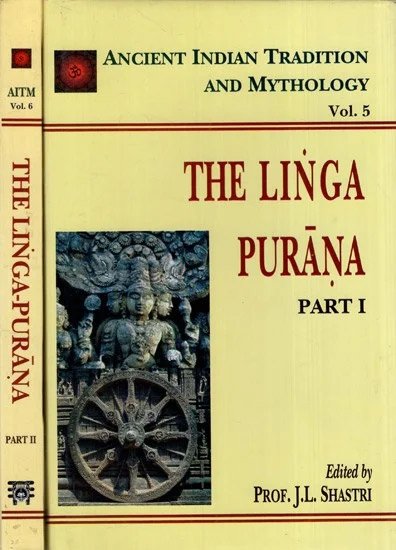The Linga Purana
by J. L. Shastri | 1951 | 265,005 words | ISBN-10: 812080340X | ISBN-13: 9788120803404
This page describes Glory of worshipping Shiva which is chapter 73 of the English translation of the Linga Purana, traditionally authored by Vyasa in roughly 11,000 Sanskrit verses. It deals with Shaiva pilosophy, the Linga (symbol of Shiva), Cosmology, Yugas, Manvantaras, Creation theories, mythology, Astronomy, Yoga, Geography, Sacred pilgrimage guides (i.e., Tirthas) and Ethics. The Lingapurana is an important text in Shaivism but also contains stories on Vishnu and Brahma.
Chapter 73 - Glory of worshipping Śiva
Sūta said:
1. When lord Maheśvara departed thence after burning the three cities in a trice the lotus-born deity (Brahmā) spoke thus in the assembly of the leading Devas.
Brahmā said:
2-6. Due to the Māyā of Lord Viṣṇu the following Daityas forsook Mahādeva and perished along with their cities and citizens. They were the grandson of Tāra of great brilliance, the powerful son of Tāraka, the asura Tārakākṣa, the powerful Kamalākṣa, Vidyunmālin, the lord of Daityas and many others along with kith and kin. They left the worship of the lord Maheśvara and so they perished. Hence Sadāśiva in the Liṅga form should always be worshipped since Devas have stability only as long as they worship the lord. Śiva should always be adored by the leading Devas with faith. The entire world is based on the Liṅga. Everything is founded in the Liṅga.
7-9. Hence, he who wishes for perfection of the soul shall worship the Liṅga. It is only through the worship of the Liṅga that Devas, Daityas, Dānavas, Yakṣas, Vidyādharas, Siddhas, Piśitāśanas, Pitṛs, Sages, Piśācas, Kinnaras and others have undoubtedly achieved Siddhi. Hence, O Devas, by any means whatsoever one should always worship the Liṅga.
10-21. The holy rite Pāśupata.
We are all Paśus of that intelligent lord of Devas. Eschewing Paśutva and adopting the holy rite Pāśupata, the eternal Mahādeva in the Liṅga form should be worshipped. The five elements should be cleansed simultaneously by means of five[1] Praṇavas along with five Prāṇāyāmas (control of breath), O leading Devas. Then the process should be repeated with four Praṇavas; then with three; and then with two, always accompanied with an equal number of Prāṇāyāmas. He shall then utter Oṃkāra and control the Prāṇa and Apāna. He shall fill all the limbs with the nectar of perfect knowledge as well as Praṇava. He shall then purify the three Guṇas, the fourth called Ahaṃkāra (ego)[2] and the tanmātras, O Devas of good holy rites. Then he shall cleanse the elements, the organs of sense and the organs of action. After cleansing the two,[3] viz., the Puruṣa and the Cidātman he shall repeat “agniḥ bhasma” (the fire is the Ash) and touch the body (?) He shall then say similarly that the wind, ether, water and earth are ashes and then smear his body with ashes during the three sandhyās throughout life. (By doing so) one becomes a Yogin conversant with all tattvas (principles). This is the Pāśupata vrata) pertaining to Śiva. O excellent Devas, it was for the liberation from bondage that this has been mentioned by the lord himself. By performing the Pāśupata rite in this manner and by worshipping the great lord in the Liṅga formerly seen by me and the noble-souled Viṣṇu, O Devas, people cease to be Paśus within a year. All rites should be performed assiduously by us after worshipping lord Īśvara externally and internally. O excellent Devas, this is my divine vow as well as that of Viṣṇu.
22-25. There is no doubt that it is the vow of the sages also. Hence one should worship Śiva. If one does not think about the only God Śiva, even for a moment, it is a loss, it is a great blemish, it is delusion, it is silence. Those who indulge in devotion to him, those who mentally bow down to him, and those who attempt to remember Bhava are never subjected to misery. The fruit of the worship of Śiva is as follows:—Pleasant and charming abodes, divine ornaments, women, and riches till one is satisfied. May those who wish for enjoyment of great pleasures or the kingdom of heaven, worship Maheśvara in the Liṅga form, at all times.
26-29. Even after striking and destroying all living beings, and after burning this entire universe if one should worship the only God Virūpākṣa (i.e. Śiva), one is never tarnished with sins.
After saying, “My Liṅga is made of rock, it is bowed to by all Devas,” Brahmā worshipped Rudra, the lord of the three worlds at the outset and eulogised the three-eyed lord of Devas with pleasing words. Ever since then, Indra and others too worshipped the lord directly after performing the Pāśupata rite and smearing their bodies with ashes.
Footnotes and references:
[1]:
i.e. the five prāṇāyāmas preceded by the five praṇavas (om syllables).
